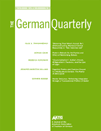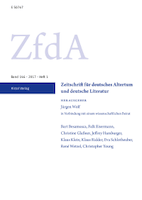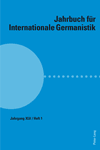
ZEITSCHRIFT FUR DEUTSCHE PHILOLOGIE
Scope & Guideline
Navigating the Rich Tapestry of German Philology
Introduction
Aims and Scopes
- Intermediality and Aesthetics:
Explores the relationships between various media forms and their aesthetic implications in literature, including the impact of visual, auditory, and textual elements on narrative construction. - Historical Contextualization:
Investigates the historical dimensions of German literature, examining how different eras influence literary styles, themes, and societal reflections. - Cultural and Political Discourse:
Analyzes the ways in which literature engages with cultural and political issues, including identity, nationalism, and globalization, particularly in relation to German-speaking contexts. - Theoretical Approaches to Literature:
Utilizes various theoretical frameworks, including postcolonial, feminist, and psychoanalytic perspectives, to deepen the understanding of literary texts and their societal roles. - Language and Linguistic Evolution:
Studies the evolution of the German language and its dialects, focusing on sociolinguistic factors and their influence on literature and communication.
Trending and Emerging
- Intermediality:
An increasing focus on intermediality highlights the interactions between different forms of media and their implications for understanding literary texts, reflecting broader cultural shifts towards multimedia experiences. - Globalization and Transcultural Studies:
Emerging research is increasingly examining the effects of globalization on German literature, exploring transcultural narratives and the implications of migration and identity. - Environmental and Ecocritical Perspectives:
There is a growing trend towards ecocritical studies that investigate the representation of nature and ecological concerns within German literature, reflecting global environmental discussions. - Digital Humanities:
The integration of digital tools and methodologies into literary studies is on the rise, enabling new forms of textual analysis and engagement with literary history. - Posthumanism and New Materialism:
Emerging themes in posthumanism and new materialism are gaining traction, challenging traditional notions of human agency and exploring the interconnectedness of humans and non-human elements in literature.
Declining or Waning
- Traditional Narratology:
Research centered on classical narratological frameworks has become less prominent, as scholars increasingly explore more dynamic and interdisciplinary approaches to narrative. - Historical Literary Criticism:
There is a noticeable decrease in papers focused solely on historical literary criticism without integrating contemporary theoretical perspectives, suggesting a shift towards more current and relevant analyses. - Romanticism as a Standalone Theme:
The exploration of Romanticism as a distinct and isolated period in German literature is waning, with scholars favoring comparative studies that intersect with modern and postmodern literary movements. - Static Linguistic Studies:
Static analyses of linguistic structures are being overshadowed by more dynamic studies that consider language in use, variation, and the socio-cultural contexts of language evolution. - Focus on Canonical Authors:
Research on canonical authors, while still significant, is declining in favor of exploring underrepresented voices and contemporary authors within the German literary landscape.
Similar Journals

NEW GERMAN CRITIQUE
Navigating the Complexities of Identity and MemoryNEW GERMAN CRITIQUE is a prominent academic journal published by Duke University Press, focusing on the dynamic intersections of German studies, cultural theory, and social thought. With its ISSN 0094-033X and E-ISSN 1558-1462, this journal facilitates a critical dialogue within the Arts and Humanities and Cultural Studies fields. As a Q3-ranked journal in both categories as of 2023, it represents a significant platform for scholars exploring contemporary issues through a German lens, addressing themes of identity, memory, and cultural politics. Although NEW GERMAN CRITIQUE is not an open-access journal, it remains a crucial resource for researchers, professionals, and students interested in the evolving landscape of cultural studies, inviting contributions that foster innovative perspectives and facilitate intellectual exchange. Founded in 1988 and continuing its vital discourse into 2024, the journal is headquartered in Durham, North Carolina, and serves as a touchstone for those engaged in the complexities of modern German culture and its global implications.

COLLOQUIA GERMANICA
Unveiling New Perspectives in Language and Literary TheoryCOLLOQUIA GERMANICA, published by FRANCKE VERLAG, serves as a vital platform for the dissemination of scholarly research in the fields of linguistics, literature, and literary theory. With a rich history spanning from 2002 to 2017 and again from 2020 to 2024, this journal is indexed under ISSN 0010-1338 and is recognized within Q4 quartile rankings in both Linguistics and Language, and Literature and Literary Theory as of 2023. Although it operates primarily on a subscription basis, this journal endeavors to enhance academic discourse and promote innovative research that contributes to our understanding of Germanic languages and literature. Researchers and professionals can greatly benefit from the journal's content, given its position in Scopus with notable rankings and percentiles in various categories. COLLOQUIA GERMANICA invites submissions that offer fresh insights into the intricacies of language and literature, making it an essential read for academics and students alike.

SPRACHWISSENSCHAFT
Elevating Academic Discourse in LinguisticsSPRNACHWISSENSCHAFT is a prominent academic journal dedicated to the field of linguistics and language studies, published by Universitätsverlag C Winter Heidelberg GmbH. With an ISSN of 0344-8169 and an E-ISSN of 2567-6563, this journal serves as a critical platform for researchers and scholars to explore innovative research developments and theoretical frameworks in linguistics. Although the journal's coverage in databases has been discontinued from 2021, it continues to hold significance in the academic community, reflected in its 2023 Q3 ranking in both the Linguistics and Language category, placing it at the 41st percentile in Arts and Humanities. Exploring various dimensions of language and communication, SPRNACHWISSENSCHAFT aims to contribute to ongoing conversations within the discipline, making it an essential resource for academics interested in the evolving landscape of linguistic research.

DAPHNIS-ZEITSCHRIFT FUR MITTLERE DEUTSCHE LITERATUR
Illuminating the Voices of Middle German LiteratureDAPHNIS-ZEITSCHRIFT FUR MITTLERE DEUTSCHE LITERATUR, published by EDITIONS RODOPI BV, is a distinguished journal dedicated to the exploration and critical analysis of Middle German literature, offering scholars a dedicated platform to contribute to the field. With an ISSN of 0300-693X and an E-ISSN of 1879-6583, the journal has established itself as a vital resource for researchers and students alike, fostering academic discourse and advancing scholarship in literature and literary theory. Operating from the Netherlands, DAPHNIS holds a notable position in the academic community, currently categorized in the Q3 quartile of literature and literary theory, ranked in the 59th percentile among its peers on Scopus. The journal’s commitment to promoting critical insights and comprehensive studies makes it an essential reference point for anyone engaged in the literary academic landscape. While it is not currently open access, access options are available through institutional subscriptions, ensuring that valuable research is disseminated widely. For contributors and readers, DAPHNIS is not just an academic journal; it is a collaborative space where scholarship meets creativity, enriching the understanding of the rich tapestry of Middle German literature.

LINKS Rivista di letteratura e cultura tedesca
Advancing Scholarly Dialogues in German StudiesLINKS Rivista di letteratura e cultura tedesca is a distinguished academic journal dedicated to the exploration and analysis of German literature and culture. Published by FABRIZIO SERRA EDITORE, this journal serves as a vital platform for researchers, professionals, and students who wish to delve into the intricacies of German cultural studies across various time periods and genres. With both ISSN 1594-5359 and E-ISSN 1724-1685, LINKS emphasizes scholarly rigor and multidisciplinary approaches, providing a space for innovative research and critical perspectives. Although the journal is not open access, it still plays a crucial role in advancing the understanding of German literature within the international academic community, contributing significantly to the field's ongoing dialogue and evolution. For those interested in enhancing their knowledge and engagement with contemporary issues in German studies, LINKS represents an essential resource.

GERMAN QUARTERLY
Navigating the Complexities of German LiteratureGERMAN QUARTERLY, published by Wiley, is a distinguished academic journal that serves as a vital platform for scholarly discourse in the fields of Cultural Studies, Literature and Literary Theory, and Visual Arts and Performing Arts. With an ISSN of 0016-8831 and an E-ISSN of 1756-1183, this journal is committed to exploring the complexities of German literature and culture from a multi-faceted perspective. It stands out in its categories, ranking Q3 in Cultural Studies and Q2 in both Literature and Literary Theory and Visual Arts and Performing Arts, as of 2023. Its Scopus ranking highlights its relevance and contribution to ongoing dialogues within the arts and humanities, making it an essential read for researchers and professionals alike. Although not an open-access journal, GERMAN QUARTERLY maintains a rigorous peer-review process, ensuring that published works meet the highest standards of academic quality. With converged contributions from 2002 to 2024, it continues to provide valuable insights and foster a deeper understanding of German heritage and its impact on contemporary culture. The journal is an indispensable resource for students and researchers seeking to broaden their knowledge and engage with the latest scholarship in these vital areas of study.

Listy Filologicke
Illuminating the Rich Tapestry of Language and Literary Theory.Listy Filologicke is a distinguished academic journal published by the Institute of Classical Studies at the Academy of Sciences of the Czech Republic, focusing on the interdisciplinary fields of History, Linguistics and Language, and Literature and Literary Theory. With an ISSN of 0024-4457 and an E-ISSN of 2570-9410, this journal has been a pivotal platform for scholarly discourse since its convergence years began in 2003. Notably, it holds a Q3 classification in History and Linguistics and Language, and a Q2 in Literature and Literary Theory as of 2023. Its rankings within Scopus illustrate its relevance and impact in academia, with noteworthy positions in the Arts and Humanities and Social Sciences categories. Researchers, professionals, and students will find Listy Filologicke an invaluable resource for exploring cutting-edge research, critical analyses, and discourse that contribute significantly to their respective fields. Based in the heart of the Czech Republic, it continues to promote scholarly excellence and foster international collaboration.

ZEITSCHRIFT FUR DEUTSCHES ALTERTUM UND DEUTSCHE LITERATUR
Celebrating the Legacy of German Language and LiteratureZeitschrift für deutsches Altertum und deutsche Literatur is a pivotal academic journal dedicated to the exploration and analysis of German-language antiquity and literature. Published by S Hirzel Verlag, this esteemed journal is based in Germany and has been contributing to the fields of Linguistics, Language, and Literary Theory since its inception. With a history spanning from 1979 to the present, the journal showcases rigorous research and critical studies that enhance our understanding of both historical and contemporary literary landscapes. Although currently not an open-access publication, Zeitschrift für deutsches Altertum und deutsche Literatur operates within the Q4 quartile in its respective categories, reflecting a unique niche within the academic community. As a valuable resource for researchers, professionals, and students alike, it fosters a deeper appreciation for the intricacies of German literature and its evolution, serving as an essential platform for scholarly discourse.

JAHRBUCH FUR INTERNATIONALE GERMANISTIK
Exploring the Depths of German Literature and LinguisticsJAHRBUCH FUR INTERNATIONALE GERMANISTIK is a prominent academic journal published by VERLAG PETER LANG AG, dedicated to advancing research in the fields of German studies, literature, and linguistics. With its ISSN 0449-5233 and E-ISSN 2235-1280, this journal provides a platform for scholarly discourse, critical analysis, and innovative studies related to German language and literary theory. Although its coverage in Scopus was discontinued in 2014, the journal continues to be influential within the academic community, evidenced by its rankings in the Arts and Humanities and Social Sciences categories. Specifically, it holds a rank of #397 in Literature and Literary Theory and #477 in Language and Linguistics, reflecting a solid presence among peers. Researchers and students alike can benefit from its insightful articles that delve into various dimensions of Germanistik, thereby fostering a greater understanding of language and cultural contexts. For those interested in contributing to this field of study, JAHRBUCH FUR INTERNATIONALE GERMANISTIK serves as an essential resource for high-quality scholarly content.

Revista de Filologia Alemana
Illuminating the Rich Tapestry of German PhilologyRevista de Filologia Alemana, published by Universidad Complutense de Madrid, serves as a vital platform for scholarly dialogue in the fields of Linguistics and Literature. With its origins dating back to 1996, this peer-reviewed journal provides insights and critical analyses that foster a deeper understanding of German philology and its broader implications. Although categorized in Q4 across both Linguistics and Literary Theory as of 2023, the journal represents a growing contribution to academic discourse, aiming to enhance knowledge and promote research within these domains. Although it does not currently offer open access, the journal continues to attract submissions from both established scholars and emerging researchers, thereby ensuring a diverse range of perspectives. With Scopus rankings highlighting its position within the academic landscape, Revista de Filologia Alemana is essential for anyone looking to delve into the intricate relationships between language and literature.